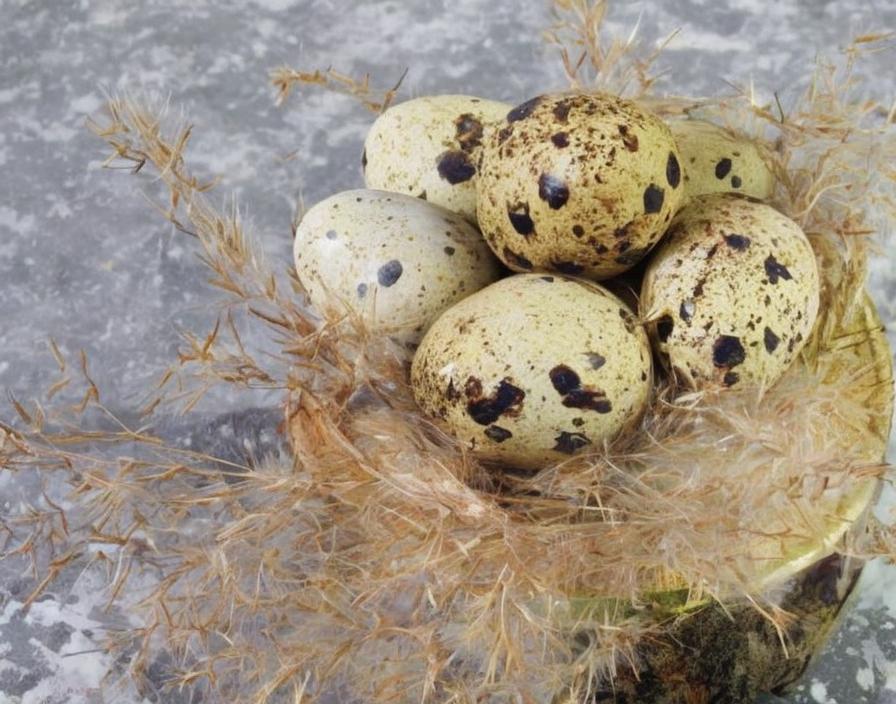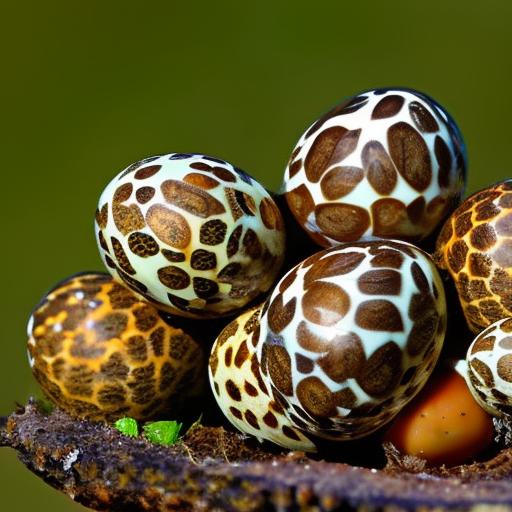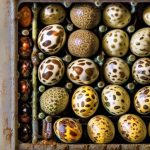Quail eggs are small, speckled eggs that come from the quail bird, a small game bird that is native to Europe, Asia, and Africa. These eggs are gaining popularity in the culinary world due to their delicate flavor and unique nutritional profile. Quail eggs are packed with essential nutrients such as protein, vitamins, and minerals, making them a healthy addition to any diet. They are also known for their beautiful appearance, with a colorful speckled shell that adds a touch of elegance to any dish. Quail eggs can be enjoyed in a variety of ways, from being boiled and served as a snack to being used in baking and cooking. Due to their small size, quail eggs are often used as a garnish or decorative element in gourmet dishes.
Quail eggs are also known for their potential health benefits. They are believed to have higher levels of certain nutrients compared to chicken eggs, including vitamin B12 and iron. Some people also believe that quail eggs may be less likely to cause allergies compared to chicken eggs, making them a suitable alternative for individuals with egg sensitivities. Quail eggs are also considered a delicacy in many cultures and are often used in traditional medicine for their perceived health benefits. With their unique flavor, nutritional benefits, and cultural significance, quail eggs have become a sought-after ingredient in the culinary world.
Key Takeaways
- Quail eggs are small, nutritious, and delicate, with a unique flavor and texture.
- Proper storage of quail eggs is essential to maintain their freshness and quality.
- Factors such as temperature, humidity, and cleanliness can affect the shelf life of quail eggs.
- Signs of spoilage in quail eggs include changes in color, texture, and odor.
- To extend the shelf life of quail eggs, store them in the refrigerator and consume them within a few weeks.
Proper Storage of Quail Eggs
Proper storage of quail eggs is essential to maintain their freshness and quality. Quail eggs should be stored in the refrigerator at a consistent temperature of around 45 to 50 degrees Fahrenheit. It is important to store quail eggs in their original carton or in an egg holder to prevent them from rolling around and potentially cracking. Storing quail eggs with the pointed end facing downward can also help maintain their freshness, as this position helps keep the yolk centered and prevents it from coming into contact with the shell, which can lead to spoilage. It is important to avoid washing quail eggs before storing them, as this can remove the protective coating on the shell and make them more susceptible to bacteria and spoilage.
Additionally, it is important to keep quail eggs away from strong-smelling foods such as fish or onions, as they can absorb odors easily. Quail eggs should also be kept away from foods with strong flavors, as they can easily pick up these flavors through their porous shells. When properly stored, quail eggs can maintain their freshness for up to 5 weeks. However, it is important to check the expiration date on the carton and use them before this date for the best quality and flavor.
Factors Affecting the Shelf Life of Quail Eggs
Several factors can affect the shelf life of quail eggs, including temperature, humidity, and handling. Quail eggs are sensitive to temperature changes and should be stored at a consistent temperature to maintain their freshness. Fluctuations in temperature can cause condensation to form on the eggshell, which can create an environment for bacteria to grow and lead to spoilage. Humidity is another important factor that can affect the shelf life of quail eggs. Excessive moisture can cause the protective coating on the eggshell to break down, making the eggs more susceptible to bacteria and spoilage.
Proper handling is also crucial in maintaining the shelf life of quail eggs. Rough handling or dropping quail eggs can cause cracks in the shell, which can lead to contamination and spoilage. It is important to handle quail eggs with care and store them in a secure container to prevent damage. Additionally, exposure to strong odors or flavors can affect the quality of quail eggs, as they can easily absorb these odors through their porous shells. By taking these factors into consideration, it is possible to extend the shelf life of quail eggs and ensure that they remain fresh and safe for consumption.
Signs of Spoilage in Quail Eggs
It is important to be able to recognize the signs of spoilage in quail eggs to ensure that they are safe for consumption. One of the most common signs of spoilage is an off-putting odor. Fresh quail eggs should have a neutral or slightly earthy smell, while spoiled eggs may have a foul or sulfur-like odor. Another indicator of spoilage is changes in the appearance of the egg white and yolk. Fresh quail eggs should have clear, firm egg whites and round, centered yolks. Spoiled eggs may have cloudy or discolored egg whites and off-center or flattened yolks.
Additionally, it is important to check for cracks or damage to the eggshell, as this can provide an entry point for bacteria and lead to spoilage. If an eggshell is cracked or damaged, it is best to discard the egg to avoid any risk of contamination. Finally, if there are any signs of mold or unusual growth on the eggshell, it is best to discard the egg immediately. By being able to recognize these signs of spoilage, it is possible to ensure that quail eggs are safe for consumption and maintain high quality in culinary preparations.
How to Extend the Shelf Life of Quail Eggs
There are several methods that can be used to extend the shelf life of quail eggs and maintain their freshness for longer periods of time. One effective method is to coat the eggshells with a thin layer of mineral oil or food-grade wax. This protective coating helps seal the pores on the eggshell and prevents moisture loss, which can help extend the shelf life of quail eggs. It is important to use food-grade products for this purpose to ensure that they are safe for consumption.
Another method to extend the shelf life of quail eggs is by storing them in a solution of water glass or sodium silicate. This method involves submerging the eggs in a solution of water glass and water, which forms a protective coating on the eggshell and helps preserve their freshness for several months. It is important to follow proper guidelines for preparing and storing quail eggs using this method to ensure safety and quality.
Additionally, storing quail eggs in a cool, dark place can help extend their shelf life. It is important to avoid exposing quail eggs to direct sunlight or high temperatures, as this can accelerate spoilage. By taking these measures, it is possible to extend the shelf life of quail eggs and enjoy their delicate flavor and nutritional benefits for longer periods of time.
Using Quail Eggs Past the Expiration Date

While it is important to use quail eggs before their expiration date for the best quality and flavor, there are some methods that can be used to determine if they are still safe for consumption after this date has passed. One method is the water test, which involves placing the quail eggs in a bowl of water. Fresh eggs will sink and lay flat on the bottom of the bowl, while older eggs will stand upright or float due to air pockets that form as they age. If an egg floats, it is best to discard it as it may no longer be safe for consumption.
Another method is the candling test, which involves shining a bright light through the eggshell to check for any signs of spoilage such as blood spots or unusual discoloration. Fresh quail eggs should have clear egg whites and yolks without any visible abnormalities. If there are any signs of spoilage during the candling test, it is best to discard the egg.
It is important to use caution when using quail eggs past their expiration date and carefully inspect them for any signs of spoilage before consuming them. By using these methods, it is possible to determine if quail eggs are still safe for consumption and enjoy their unique flavor and nutritional benefits.
Conclusion and Summary
In conclusion, quail eggs are a unique and versatile ingredient that offers a delicate flavor and a range of nutritional benefits. Proper storage of quail eggs is essential to maintain their freshness and quality, including storing them in the refrigerator at a consistent temperature and avoiding exposure to strong odors or flavors. Several factors can affect the shelf life of quail eggs, including temperature, humidity, and handling, so it is important to take these factors into consideration when storing and handling quail eggs.
It is important to be able to recognize the signs of spoilage in quail eggs, such as off-putting odors, changes in appearance, or damage to the eggshell. By being able to identify these signs, it is possible to ensure that quail eggs are safe for consumption and maintain high quality in culinary preparations.
There are several methods that can be used to extend the shelf life of quail eggs, such as coating the eggshells with mineral oil or storing them in a solution of water glass. These methods can help preserve the freshness of quail eggs for longer periods of time and ensure that they remain safe for consumption.
While it is important to use quail eggs before their expiration date for the best quality and flavor, there are some methods that can be used to determine if they are still safe for consumption after this date has passed. By using caution and carefully inspecting quail eggs for any signs of spoilage, it is possible to enjoy their unique flavor and nutritional benefits even after the expiration date.
In summary, proper storage and handling of quail eggs are essential in maintaining their freshness and quality. By taking these measures into consideration, it is possible to enjoy the delicate flavor and nutritional benefits of quail eggs in a variety of culinary preparations while ensuring safety and quality.
If you’re wondering how long quail eggs will keep, you may also be interested in learning about the best practices for keeping chickens and maintaining their coop. Check out this informative article on Producers Pride Sentinel Chicken Coop to discover a reliable and efficient coop option. Understanding the importance of a suitable coop and how to insulate it, as discussed in the articles on what kind of coop is best for chickens and how to insulate a chicken coop, can greatly contribute to the well-being of your poultry and the quality of their eggs.
FAQs
How long can quail eggs be stored at room temperature?
Quail eggs can be stored at room temperature for up to 2 weeks.
How long can quail eggs be stored in the refrigerator?
Quail eggs can be stored in the refrigerator for up to 2 months.
Can quail eggs be frozen for long-term storage?
Yes, quail eggs can be frozen for long-term storage. They can be kept in the freezer for up to 1 year.
How can I tell if quail eggs have gone bad?
You can tell if quail eggs have gone bad by performing a float test. Place the eggs in a bowl of water – if they sink and lay flat on the bottom, they are fresh. If they stand upright or float, they are no longer fresh and should be discarded.
Can I eat quail eggs after the expiration date?
It is not recommended to eat quail eggs after the expiration date. It is best to discard them if they have passed the expiration date.
Meet Walter, the feathered-friend fanatic of Florida! Nestled in the sunshine state, Walter struts through life with his feathered companions, clucking his way to happiness. With a coop that’s fancier than a five-star hotel, he’s the Don Juan of the chicken world. When he’s not teaching his hens to do the cha-cha, you’ll find him in a heated debate with his prized rooster, Sir Clucks-a-Lot. Walter’s poultry passion is no yolk; he’s the sunny-side-up guy you never knew you needed in your flock of friends!







